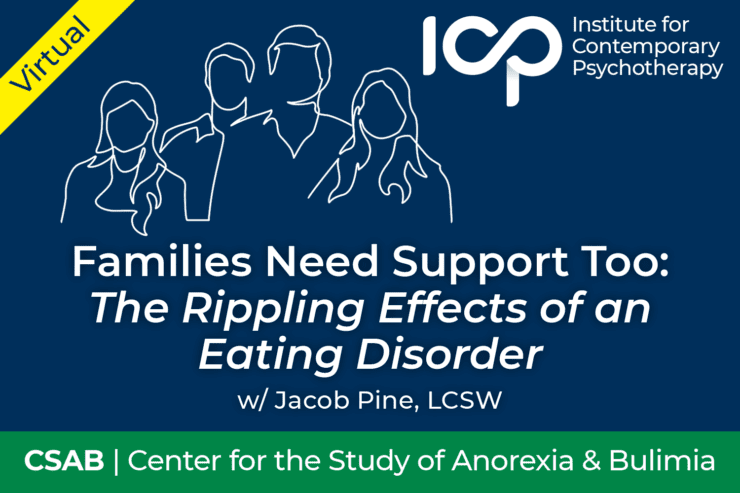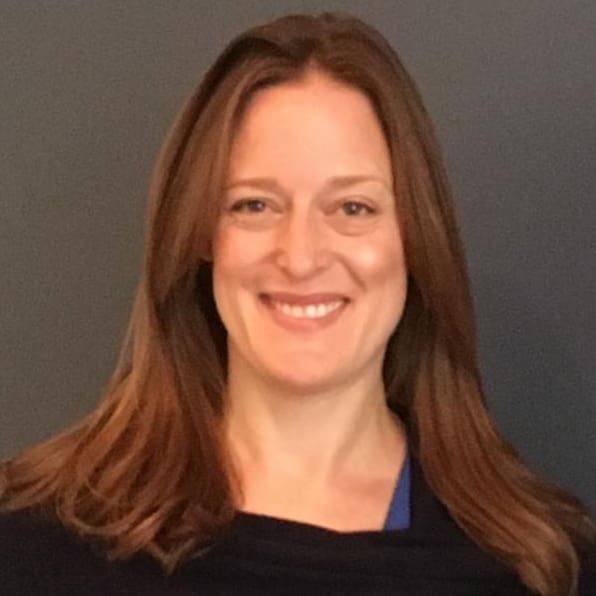

Navigating the maze of the mental health treatment world—especially the eating disorder wing of that world—is increasingly complicated, nerve-wracking, and expensive. Family members of a person with an eating disorder are often asked (and frequently want) to get treatment for themselves, but sometimes don’t know how to find it, what sort of treatment to get, and in some cases, why it is important at all. This virtual interactive seminar will address these questions and many others that family and friends often have, but don’t know whom to ask.
About the Presenter
Jacob Pine is a licensed Clinical Social Worker in private practice in Manhattan. He grew up in New York City, and did his undergraduate studies at The Johns Hopkins University and The Peabody Conservatory in Baltimore. He earned his Masters degree in social work from Fordham University, and received his certificate in the integrated treatment of eating disorders from the Center for the Study of Anorexia and Bulimia in 2010. He has been Co-director of CSAB for 5 years. He has presented, supervised, and taught in numerous capacities, and has had multiple articles published about his experience running an eating disorder group for men. He is well-versed in a wide variety of theories and techniques, and uses them as indicated by both scientific research and professional experience.
__________________________________________________
To subscribe to ICP's Mailing List for Mental Health Providers, click here.
__________________________________________________


Approved for 6 NYS CE credits
Traverse the five stages of CBT-E, from assessment and case conceptualization to relapse prevention. Engage in dynamic activities such as case studies, role-playing, and group discussions, reinforcing core CBT principles and practical application. We will learn cognitive behavioral techniques as we work through the stages, honing your ability to support and enhance client engagement. These will include navigating exposure methodologies to confront dietary fears, as well as coping strategies to address anxiety and challenges. As we delve into ethical considerations and therapeutic boundaries, you’ll be well-prepared to navigate real-world scenarios ethically and effectively. Walk away with a comprehensive toolkit, ready to guide individuals towards sustainable recovery.
An important note about CEs:
ICP is an approved provider of continuing education credits for social workers, mental health counselors, marriage and family therapists, psychologists and psychoanalysts through the New York Department of Education. If your license is from a different state, please contact your state’s licensing board to find out if they will accept CE credits for New York State. If your license is from another state, please enter your license number with your state in parenthesis, ie 54321 (CA).
__________________________________________________


Approved for 2 NYS CE credits
Patients who come to us with eating disorders initially want change and they are distressed. Most of the time, however, the powerful reasons for the development of their eating disorder, will reemerge. This workshop will focus on the specific outcome and process resistances that are common to eating disorders, and will offer therapists specific tools to use with patients at the outset so that the agenda for the work is established. Ways to positively reframe and maintain the advantages of symptoms will be identified. Additionally we will focus on ways to preserve safety and to offer the Gentle Ultimatum in order to effectively set up a treatment plan that takes pressure off of the therapist needing the patient to change.
About the presenter:
Donna Fish LCSW-R, is a licensed clinical social worker and currently runs a private practice in Manhattan. Current faculty positions include the Center for the Study of Anorexia and Bulimia, and adjunct at Ramapo College where she teaches the clinical course for 2nd year MSW students. Ms. Fish’s prior guest lecture and adjunct positions include Harvard Medical School Dept. of Continuing Ed., and Columbia University. Following the publication of her book “Take the Fight out of Food: How to Prevent and Solve Your Child’s Eating Problems”, Ms. Fish has been a consultant to NYC’s Administration of Child Services, Head Start, Bellevue and Mount Sinai Hospital, the Minnesota School Board, and Renfrew Center.
An important note about CEs:
ICP is an approved provider of continuing education credits for social workers, mental health counselors, marriage and family therapists, psychologists and psychoanalysts through the New York Department of Education. If your license is from a different state, please contact your state’s licensing board to find out if they will accept CE credits for New York State. If your license is from another state, please enter your license number with your state in parenthesis, ie 54321 (CA).
__________________________________________________


Approved for 4.5 NYS CE credits
How, where, and when to get treatment for an eating disorder is one of the more difficult and important decisions an individual, family or treatment provider will have to make. This three-session seminar on the treatment of eating disorders will serve as a primer to the different treatment models often used to treat eating disorders. We will also explore the different levels of care frequently utilized in eating disorder treatment, and when and how to decide which level of care is necessary at the different stages of the disorder. This class will introduce participants to concepts of psychodynamic psychotherapy, CBT, DBT, FBT/Maudsley, IFS, and other theories, and their applications to eating disorder treatment. We will become familiar with the nuanced differences between inpatient hospitalization, residential treatment, PHP, IOP, and outpatient treatment.
An important note about CEs:
ICP is an approved provider of continuing education credits for social workers, mental health counselors, marriage and family therapists, psychologists and psychoanalysts through the New York Department of Education. If your license is from a different state, please contact your state’s licensing board to find out if they will accept CE credits for New York State. If your license is from another state, please enter your license number with your state in parenthesis, ie 54321 (CA).
__________________________________________________


Approved for 4.5 NYS CE credits
How, where, and when to get treatment for an eating disorder is one of the more difficult and important decisions an individual, family or treatment provider will have to make. This three-session seminar on the treatment of eating disorders will serve as a primer to the different treatment models often used to treat eating disorders. We will also explore the different levels of care frequently utilized in eating disorder treatment, and when and how to decide which level of care is necessary at the different stages of the disorder. This class will introduce participants to concepts of psychodynamic psychotherapy, CBT, DBT, FBT/Maudsley, IFS, and other theories, and their applications to eating disorder treatment. We will become familiar with the nuanced differences between inpatient hospitalization, residential treatment, PHP, IOP, and outpatient treatment.
An important note about CEs:
ICP is an approved provider of continuing education credits for social workers, mental health counselors, marriage and family therapists, psychologists and psychoanalysts through the New York Department of Education. If your license is from a different state, please contact your state’s licensing board to find out if they will accept CE credits for New York State. If your license is from another state, please enter your license number with your state in parenthesis, ie 54321 (CA).
__________________________________________________


Approved for 4.5 NYS CE credits
How, where, and when to get treatment for an eating disorder is one of the more difficult and important decisions an individual, family or treatment provider will have to make. This three-session seminar on the treatment of eating disorders will serve as a primer to the different treatment models often used to treat eating disorders. We will also explore the different levels of care frequently utilized in eating disorder treatment, and when and how to decide which level of care is necessary at the different stages of the disorder. This class will introduce participants to concepts of psychodynamic psychotherapy, CBT, DBT, FBT/Maudsley, IFS, and other theories, and their applications to eating disorder treatment. We will become familiar with the nuanced differences between inpatient hospitalization, residential treatment, PHP, IOP, and outpatient treatment.
An important note about CEs:
ICP is an approved provider of continuing education credits for social workers, mental health counselors, marriage and family therapists, psychologists and psychoanalysts through the New York Department of Education. If your license is from a different state, please contact your state’s licensing board to find out if they will accept CE credits for New York State. If your license is from another state, please enter your license number with your state in parenthesis, ie 54321 (CA).
__________________________________________________


This three-session introduction to eating disorders seminar will bring attendees into the tricky world of eating disorder diagnosis. We will discuss the differences between disordered eating and eating disorders. We will examine sub-clinical or “off-label” eating disorders and how to spot burgeoning eating disorders in people across the lifespan. In the DSM-V, the delineations between the various eating disorders are clear, but in the real world, the differences are much more nuanced and, often, difficult to ascertain. We will use the DSM as the guide for diagnosis, and using clinical examples and participants’ cases and questions, we will discuss what is, and what isn’t, an eating disorder.
__________________________________________________
Oops! We could not locate your form.


As therapists, our most essential instrument to engage our clients is our selves–no matter what theories or techniques guide our work. But very little is written or taught about how we can prepare and use our instrument in session, moment-to-moment, with each client–particularly in terms of our implicit/ non-verbal communication as it transmits through our eyes, faces, bodies, and voices. The more aware we are of our unique instrument and how we use it, the more ethical our clinical practice will be with each unique person who seeks our help.
Utilizing his experience as both an actor and a therapist, Mark O’Connell will offer you ways to prepare and to use your instrument with awareness, responsiveness, authenticity, intentionality, versatility, responsibility, and self-care. Participants will discuss ethical dilemmas in clinical practice with individuals, couples, and families, including questions around self-disclosure, countertransference, and confidentiality. And we will study, from an ethical perspective, how we can most effectively use ourselves authentically, even in the most challenging clinical scenarios. Mark will also guide you through theatrical concepts of “objectives,” and “roles” within relationships to gain perspectives on effective communication–beyond the words we speak–and to develop and trust your own sense of ethical and clinical best practices.
About the Presenter
Mark O’Connell, LCSW-R, MFA, is a psychotherapist in New York City, and a trained actor. He’s the author of the books The Performing Art of Therapy: Acting Insights and Techniques for Clinicians, and Modern Brides & Modern Grooms. His wide ranging articles have been published in various clinical journals and popular sources, and he writes the Psychology Today blog Quite Queerly.
For more information about Mark’s workshops on using the therapist’s “instrument,” visit:
www.theperformingartoftherapy.com.
And for more information about Mark’s psychotherapy practice visit: www.markoconnelltherapist.com
For questions about accessibility or to request accommodations please contact Oranda Barnes, Program Manager, at 212-333-3444 ext 107 or at@icpnyc.org.
Refund Policy: Please note that refunds for all AT events are available up until one week before the start of the workshop or module, unless otherwise stated.
__________________________________________________